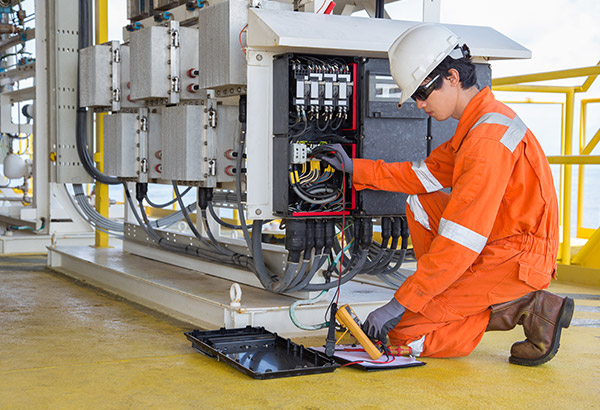
An Intensive 5-day Training Course
Electrical Construction and
Operational Standards in the Oil & Gas Field
Best Practices, Standards and Compliance
Scheduled Dates
Classroom
| 13-17 Apr 2026 | Dubai - UAE | $5,950 | RESERVE A SEAT |
| 08-12 Jun 2026 | Dubai - UAE | $5,950 | RESERVE A SEAT |
| 30 Nov-04 Dec 2026 | Dubai - UAE | $5,950 | RESERVE A SEAT |
| 14-18 Dec 2026 | Pretoria - South Africa | $5,950 | RESERVE A SEAT |
Would an alternative date be more suitable?
We offer a variety of tailored training options, customized to meet your organisation's needs. Delivered anytime, anywhere, we make it easy to bring expert training directly to your team.
Why Choose this Training Course?
An ideal course to introduce or refresh your onsite Technicians and Engineers with knowledge of Electrical Construction standards and compliance with current legislation and practices. A perfect course for any practicing Technician or Engineer to hone their skills and knowledge.
The benefits to a company or individual are far reaching. The benefits of having a course delivered to you and your employees, which will not only develop their skills and understanding, but will also further refresh and add to existing technical skill within your work force. The course will enable participants to develop their knowledge with Electrical and Instrument construction techniques, with a large emphasis on potentially explosive atmospheres, which are commonly found within Oil & Gas field type installations.
This seminar will highlight:
- Knowledge of onsite health and safety such as Permit to work, Electrical isolation and Inspection & Testing.
- Development and addition of skills which are needed to work within an Oil & Gas Installation.
- The implications and use of the IEC 60079-14 and associated series of standards for safe Oil & Gas installation compliance.
- Minimum standards versus Best practice within Oil & Gas Installations.
- Competence of personnel who work within Oil & Gas Installation relating to construction.
What are the Goals?
At the end of this seminar, you will learn to:
- Elaborate on the Installation requirements of IEC 60079-14 and some requirements of IEEE standards.
- Discuss requirements of competent personnel onsite.
- Demonstrate the correct installation of a variety of Oil and Gas suitable cable Glands and accessories.
- Apply Health and Safety, Isolation and safe working practice requirements to their workplace.
- Use a variety of technical information such as schematic diagrams, wiring diagrams and area classification drawings.
Who is this Training Course for?
This course is suitable to a wide range of professionals but will greatly benefit:
- Electrical and Instrument Technicians
- Electrical and Instrument Engineers
- Personnel whose work involves construction of equipment and systems on an Oil & Gas installation
- Supervisors
- Design Engineers (for understanding of Installation and Maintenance techniques)
- Mechanical Maintenance Technicians
- Mechanical Maintenance Engineers
How will this Training Course be Presented?
A variety of technical lectures, practical demonstrations and practical exercises will be used to deliver the training to candidates. Case studies and examples of good and bad practice will also be demonstrated through practical demonstration and case study DVD. An end of course practical and Written Assessment will also be completed by all candidates.
Daily Agenda
Day One: Introduction and Basic principles
- Induction
- Introduction to Health and safety
- Dangers of Electricity
- Factors that affect Electric shock
- Historic background of legislation
- Examples of Oil & Gas case study incidents
- Causes of explosion
- Arc Blasts
- Common Electrical Safety Rules
Day Two: Basic Principles and General Concepts
- Common Electrical safety Rules recap
- Common Electrical Safety Procedures
- Low Voltage switching operations
- Live working
- Battery systems
- Arc flash/Blast Mitigation
- Competence levels of personnel (Low Voltage)
- Introduction to Common Electrical safety documents
Day Three: Protection Concepts
- Introduction to Common Electrical Safety Documents (Including Electrical Permit to work, Limitation of Access and Sanction for Test)
- Isolation techniques + Earthing (LV and HV)
- Basic Introduction to Switching programs and switching logs
- Switching Exercise
- Introduction to Technical information used in Oil & Gas Fields (Layout drawings, wiring diagrams, P&ID, etc.
- Basic Introduction to Hazardous Area Installations (Oil & Gas)
- Basic Area Classification including (Geometry of release, Release velocity, Ventilation, Relative density)
Day Four: Protection Concepts, Hybrid Systems and Certification Marking
- Basic Introduction to concepts used in Oil & Gas Installations such as IEC EPL’s, ATEX Categories, Gas groups, Flash point, Ignition Temperature and LEL/UEL.
- Temperature (T-ratings)
- Basic introduction to Protection concepts including Ex d, Ex e, Ex n, Ex i and Hybrid systems.
- Introduction to wiring systems and Glanding
Day Five: Inspection, Wiring Systems and Assessments
- Certification and marking
- Basic Introduction to Grades and types of inspection
- Maintenance considerations
- End of course theory Assessment (Multi-choice question paper)
- End of course practical Assessment (Installation of gland into Enclosure)
Certificate
- On successful completion of this Training Course / Online Training Course, a PetroKnowledge Certificate / E-Certificate will be awarded to the delegates.
